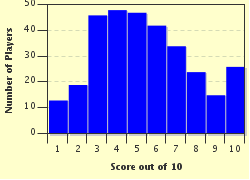Quiz Answer Key and Fun Facts
1. At the end of the Great War which of these phrases did the German Army use to explain their defeat?
2. 'We will squeeze the German lemon till the ________ squeak!' reflected the kind of conditions the British public wanted to impose on Germany in the wake of the Great War.
3. During WWII the Allies resolved that 'Unconditional Surrender' would be only acceptable condition for cessation of hostilities. At which of these war time conferences did the Western Allies come to this agreement?
4. In March 1946, at Fulton Missouri, the by now former Prime Minister, Winston Churchill, made his prophetic speech in which he declared that; 'From Stettin in the Baltic to __________ in the Adriatic an "iron curtain" has descended across the continent'. To which of these Adriatic cities was Churchill referring?
5. As the war in Vietnam escalated in 1965 this pugnacious general suggested that North Vietnam needed to stop their aggression 'or we're going to bomb them back to the Stone Age.' Which of these generals made this statement?
6. In February 1960 which of these British Prime Ministers declared in a speech to the South African parliament that 'A wind of change is blowing through this continent'?
7. In January 1968 a new leader of the Communist Party of Czechoslovakia announced a programme of reforms dubbing them 'Socialism with a human face'. Who was this leader?
8. During the 19th century there was a widespread belief that it was inevitable that the United States would occupy all the lands between the eastern seaboard and the Pacific Ocean. What was the term used to describe this?
9. In March of 1942 President Roosevelt ordered that General Douglas MacArthur be evacuated from the Philippines to avoid capture by the Japanese. On reaching Australia he made his now famous "I shall return" pledge to newsmen. This pledge was fulfilled when he stepped ashore on which island in October 1944?
10. "Feed the world" was the theme used during a famous concert in July 1985 to raise funds to relieve a famine in which of these African countries?
Source: Author
mstanaway
This quiz was reviewed by FunTrivia editor
bloomsby before going online.
Any errors found in FunTrivia content are routinely corrected through our feedback system.

